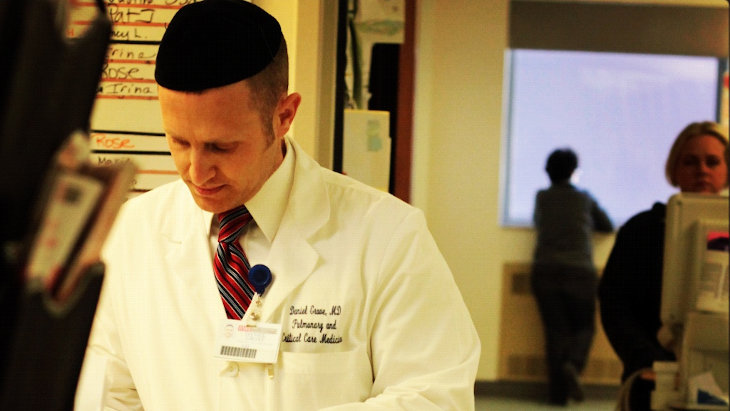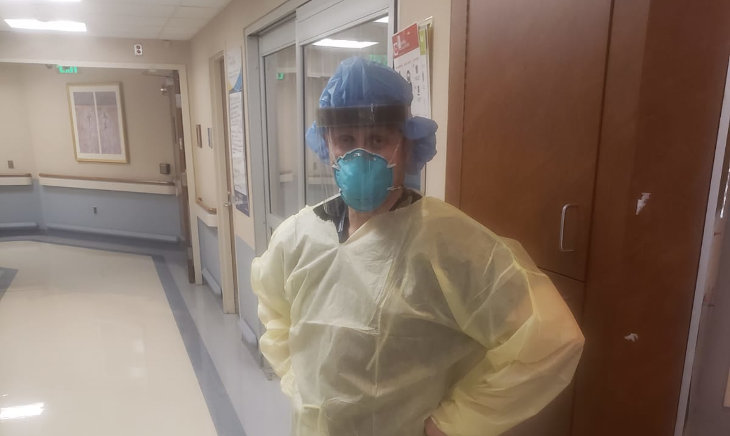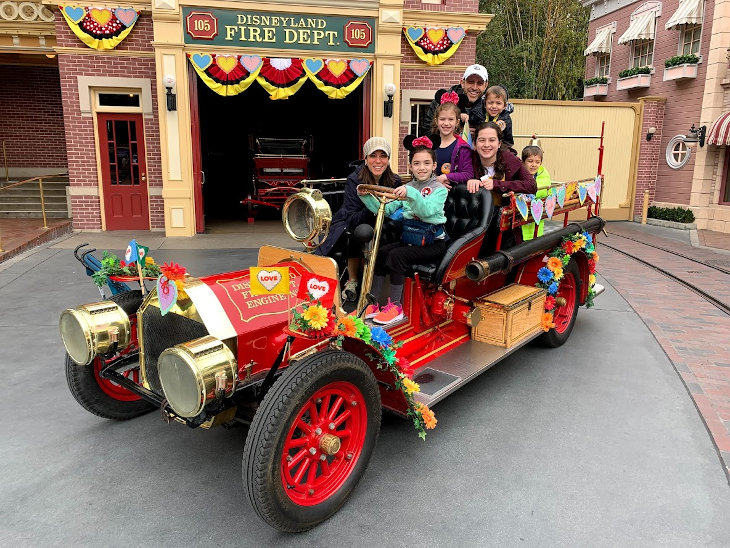 Vampire Weekend's Surprising Jewish Stories
Vampire Weekend's Surprising Jewish Stories


7 min read
Could I actually have the virus? I’m supposed to be the one treating the sick, not the other way around.
Monday morning, we continued our work as usual, making rounds, medication orders, X-rays, and labs, but you could tell that something was different in the ICU. A palpable tension hung in the air. This was the same anxiety that permeated the empty schools, disrupted households, and traffic-less Baltimore streets. Is the coronavirus going to come? When?
In our hospital, this feeling was a bit heavier. Throughout my training and into my career as an intensive care physician, there have been moments where I've been overwhelmed – when there seemed to be too many patients who had too many problems that I could not solve. There were moments where I was so tired that I had to will my feet to take one step and then another. There were moments where I felt I would collapse from the burden of feeling I will never know enough. Fortunately, as I became better trained and more experienced, that helpless feeling came less and less until it was a faded memory.
But that Monday there was a fear that those feelings were returning, encroaching on the horizon like a brewing storm. Would there be so many patients that I'd become overwhelmed? Would fatigue lead to mistakes that cost lives? Would I have to decide who lives or dies because there are not enough ventilators?
I followed the routine - rounds, medical decisions, teaching the residents, bedside procedures, seemingly endless documentation. No hint of the virus in the patients in the beds, only in the anxieties of the staff.
I did my job as usual until Thursday evening when everything changed. I noticed that I was feeling a bit hoarse. Then I developed a mild dry cough. It wasn’t severe and otherwise I felt fine. I had no fevers, no fatigue, no headache, just a nagging dry cough.

Then the anxiety crept in. Could I have the virus? It can’t be. Not me. I’m supposed to be the one treating the sick, not the other way around. While I was not concerned about my health, my first response was self-centered and ugly, although undeniably human: I didn’t want to be known as the guy who spread this around my community or around my hospital. I didn’t want to be seen as a scourge sickened with a plague dreaded by all. I didn’t want to be a pariah to be avoided and cursed.
Then the second fear set in. If I was infected, I had threatened my coworkers and the patients in our care. The weight of this hit me like punch to the gut. You can’t quarantine the entire staff of an intensive care unit! There aren’t enough people to fill in the gaps. What would happen? Would patient care be compromised? Would people suffer because of me?
Then came the internal debate. It was only a mild cough. Maybe it was allergies. We did have some flowers around the house. Perhaps I was developing asthma. Maybe it was from speaking too much on rounds. Could it be acid reflux?
I moved into the basement and taped down a line on the carpet that no one would cross. No one was to be within six feet of me.
That evening I thought of saying nothing and going to work the next day but my better angels got the best of me. I arranged for someone to cover me the next day. I moved into the basement and taped down a line on the carpet that no one would cross. No one was to be within six feet of me. All handles were sanitized. All surfaces were washed. I got tested and I waited. Meanwhile my cough worsened, my temperature spiked, and the chills and aches assaulted my body.
The next evening the hospital administrator called. He had a tone that was a mix of paternalistic authority and a hint of pity. “Your COVID test was positive,” he said setting off a paradoxical flood of emotion. I was both surprised and not surprised, relieved and anxious, defiant and resigned all in a period of 3 ½ seconds but I knew this was coming and I slowly settled in to my new reality.
 Dr. Grove with his family
Dr. Grove with his family
Quite often, the psychological response to infections such as this is to treat it as something to be ashamed of, something to hide from the world. As people have been getting sick, they have been keeping it to themselves. They are not telling those they had contact with that they were sick. I was infected when I encountered people who were mildly sick when I was with them. They didn’t tell me later when they got worse. If they would have told me, I would have pulled myself out of the ICU sooner and prevented a crisis at the hospital.
I then got to thinking. Look at the power we hold. This all started when one innocent and unsuspecting person in a place far away in geography, imagination, and experience went to buy food at a busy market, probably part of his regular routine. He touched something, he touched his face and he changed history. I was sitting here in my basement and the world had been turned upside down because the unwitting act of one man half way across the globe started a chain reaction of actions and inactions.
If he could change the world with one action, all the more so I could change it with many.
So I got to work. I contacted everyone I had an interaction with and told them I was sick. I created a website where I could document my experience and educate as many people as possible. As people heard of my infection, they called and I helped educate them and encouraged them to inform others of their infection.
In the process I learned that putting on the white coat and solving the big problems doesn’t make me impervious to the impacts of disease. I learned that in the face of the overwhelming force of uncertainty and fear, the only hope we have is to rely on the knowledge that God is running the world – without that we’re all floating in a meaningless void of uncaring randomness where something a picometer across can destroy everything in an instant.
Your one small act can change the world for the good in ways you cannot imagine.
I also learned the power He gives to us to make choices and make a difference. We can use our decisions to bring meaning and purpose to that void by seeing through the randomness and identifying the meaning it waits to reveal.
Today, one touch of a door handle, one uncovered cough, and one uninformed sick contact can impact the entire world. But before anyone had ever heard of a coronavirus, the impact was the same and one harsh word, one piece of gossip, one disapproving glare could lead to a chain reaction that crossed the globe like a spreading fire without you even knowing.
And the opposite is also true. One compliment, one smile, one small act of kindness can change the world as well. Your one small act can change the world for the good in ways you cannot imagine, even though you likely will never know how. The coronavirus has taught us our power. Your social distancing, hand washing, and informing people when you’re sick can make a real and lifesaving difference.
In the coming weeks and months, when the virus has cleared and the sick begin to convalesce, there will be endless opportunities to do so much more. The neglected need to be reconnected, finances need to be supported, and relationships need to be rebuilt. Imagine what the sum of millions of small acts of kindness can do. It is my sincere hope that we all will take the message God is sending us to heart and make the most of the many opportunities we have every day to change the world with one small act and to truly feel the power we have. In reality, all we are is the sum total of all of our small actions, it's time we make them count.
Visit Dr. Grove's informative site here: mycovidjourney.com
